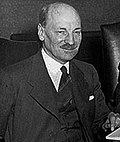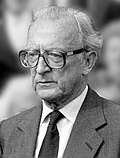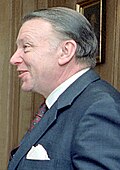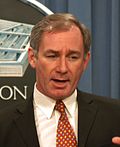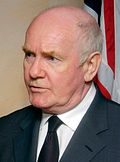| United Kingdom Secretary of State for Defence | |
|---|---|
 | |
 | |
| Ministry of Defence | |
| Style |
|
| Type | Minister of the Crown |
| Status | Secretary of State |
| Member of | |
| Reports to | The Prime Minister |
| Seat | Westminster |
| Nominator | The Prime Minister |
| Appointer | The Monarch (on the advice of the Prime Minister) |
| Term length | At His Majesty's pleasure |
| Constituting instrument | Defence (Transfer of Functions) Act 1964 section 1(1)(a) |
| Precursor | |
| Formation | 1 April 1964 |
| First holder | Peter Thorneycroft |
| Deputy | Minister of State for Defence Procurement and Industry |
| Salary | £159,038 per annum (2022) [1] (including £86,584 MP salary) [2] |
| Website | www |
| This article is part of a series on |
| Politics of the United Kingdom |
|---|
 |
The secretary of state for defence, also known as the defence secretary, is a secretary of state in the Government of the United Kingdom, with responsibility for the Ministry of Defence. [3] As a senior minister, the incumbent is a member of the Cabinet of the United Kingdom.
Contents
- Responsibilities
- History
- Minister for Co-ordination of Defence (1936–1940)
- Minister of Defence (1940–1964)
- Secretary of State for Defence (1964–present)
- Timeline
- References
- External links
The post of secretary of state for defence was created on 1 April 1964, replacing the positions of minister of defence, first lord of the admiralty, secretary of state for war, and secretary of state for air, while the individual offices of the British Armed Forces were abolished and their functions transferred to the Ministry of Defence. In 2019, Penny Mordaunt became the UK's first female defence secretary. [4]
The secretary of state is supported by the other ministers in the Defence Ministerial Team and the MOD permanent secretary. The corresponding shadow minister is the shadow secretary of state for defence, and the secretary of state is also scrutinised by the Defence Select Committee. [5]
The current secretary of state for defence is John Healey, who was appointed on 5 July 2024 following the 2024 United Kingdom general election. [6]







